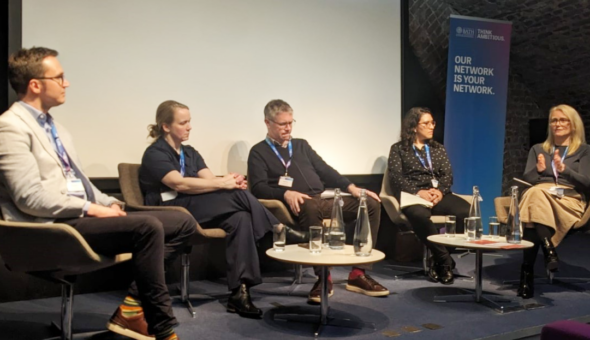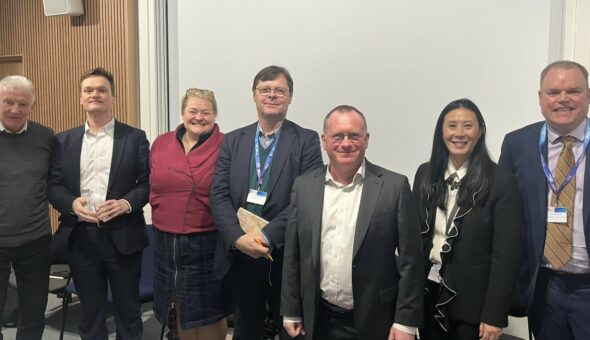He used the "Spiral of Silence" to predict Trump's election, and is now speaking out about imposter syndrome in management academia. In the second of our "Researcher in the Spotlight" series, we talk to Thomas Roulet about his research, the freedom of academic life and the value of social media.
You’re now in Cambridge – tell us about the path you took to get there
I finished my PhD in 2014 and then did my post doc in Oxford. I’ve taught in various universities – including some time in Bath – and I joined Cambridge in August 2018. I’m a Senior Lecturer in Organisation Theory at the Judge Business School, but I’m also attached to a college – I’m a Fellow in Sociology and Management Studies at Girton, the college founded by the feminist movement 150 years ago. I enjoyed being part of a college in Oxford so I’m glad that I have that opportunity here too. It means that I teach undergraduates in sociology as well as lecturing in management in the Business School.
What are you working on at the moment?
The main focus of my research is negative social evaluations, things like stigma, scandals and disapproval. I look at this at both the organisational and individual level. I’ve just finished writing a book on the subject which hopefully will be out next year, published by Stanford University Press. Writing a book is a long process – I started this in 2015!
The work around stigma and scandals is very current and pretty scary – for example politicians using controversies to fuel campaigns. Have a look at the new BBC show Years and Years – it’s all about fake news and the rise of new populist politicians. It’s a drama but it’s so close to reality.
I’m also interested in how social evaluation can have an impact on other issues like the environment and waste management. It’s interesting how people compete with each other - people want to be positively evaluated so they start engaging with pro-environmental practices such as reducing their waste, for example.
It was through my work on evaluation and stigma that I became interested in imposter syndrome. How we perceive ourselves, and how others make us perceive ourselves, are major drivers of our behaviours. This is the subject of a recent paper I wrote with Joel Bothello – we were particularly interested in what we saw as a growing phenomenon amongst junior academics like ourselves, this sense of anxiety and self‐doubt about the legitimacy of our profession and our position within it.
In addition to my own academic production, I am the co-editor in chief of M@n@gement – which was founded 20 years ago as the first open access journal in the field of management. I'm trying through my editorial activities to change our publication ecosystem, to make it more inclusive and less profit oriented.
Which piece of work are you most proud of?
While I was at Bath, I published a theory paper on public opinion and the stigmatisation of practices. It was about this theory of the Spiral of Silence. It’s a theory that individuals have a fear of isolation, resulting from the idea that a social group or society in general might exclude members due to them holding what they think is a minority opinion. So people stay quiet rather than voice what they perceive to be unpopular opinions.
At the time, it didn’t seem like it was that relevant or have much practical application. But now, we find that it’s extremely relevant for explaining the polarisation in political opinion that we’re seeing at the moment, and the unexpected triumphs of Trump, Johnson and Brexit.
Before the Trump election, I had an opinion piece published in the Telegraph – I used the theory to explain why we were underestimating Trump’s chances of being elected. He had a huge number of hardcore supporters but they were totally invisible because they didn’t want to admit publicly to their support. So the pollsters didn’t capture what people were really thinking. Things are a bit different now – people are much more vocal, but back then it was impossible to capture how prevalent these opinions were. And so the result was a huge shock for many.
The same theory has been applied more recently to the Indian election. We’re seeing much more polarisation, people becoming more and more opposed to each other – we’re more divided than at any other time.
I made the prediction about Trump to be provocative, because I thought people were not really taking notice of what was happening. I didn’t really believe he would be elected, but then it came true! Brexit had already showed us what could happen. Political mobilisation is now quite high. People realise what can happen, that there are others who might share their apparently unpopular opinions and they’re becoming more vocal. We see people being very controversial to stir up support and encourage opposition.
Who would you say as had the most influence on your work?
There are many academics who have been inspiring – many senior people who are very well known, experts in their field.
But what I have found really helpful is not necessarily looking up to very senior people, but enjoying discussions with my peers and other junior scholars. I’ve taken inspiration from people who are a little bit more senior. For example when I just started my PhD, one of the others who was just finishing theirs was Jean-Phillipe Vergne. He was incredible at looking at new topics and his work really inspired me. He now works on crypto-currency. He was one of a wave of junior people who came up with new ideas, who was interested in new phenomena and really pushed the boundaries of our field. It was he who inspired me to write my book as he himself wrote an exciting book on piracy and capitalism with Rudolph Durand.
What would you have done if you weren’t an academic?
Before being an academic I was in investment banking. It was fun and stimulating, but I did not find clear purpose, and it was too monotonous.
In academia, there’s much more freedom, and there’s space to think. Yes, we’re pressurised to publish and we have teaching responsibilities, but we can also find purpose through other things like public engagement, writing books, doing interdisciplinary research.
It’s a pity that sometimes, due to organisational pressures, we forget what a huge luxury it is to do this job. We get to interact with great minds who then influence you for the rest of your life. I couldn’t do any other job – nothing else would offer so much freedom to think.
You're one of our top thinklisters - is social media still an important part of your work as an academic?
Yes, I still do a huge amount. Over the last couple of years I’d say I’ve seen more of the negative aspects of it. But I still really enjoy it – it bridges gaps between fields, helps me to make connections I otherwise couldn’t make. It’s great for procrastination, for sparking off new ideas to pursue.
I think we should all be engaged academics. A lot of people are shy and don’t want to engage – they’re afraid that they don’t have anything to say. But it’s not about having strong opinions, it’s just about engaging in a dialogue. You just need to be willing to connect with others.
Respond



